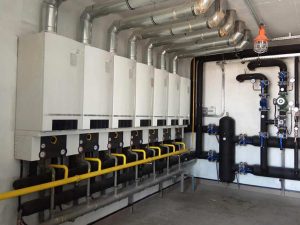Preventive maintenance is crucial for commercial boilers, not just to prolong their life but also to ensure safety and efficiency. HVAC companies can attest to the importance of maintaining commercial boiler systems regularly. They perform necessary checks to prevent issues that could lead to costly repairs, energy inefficiency, or safety hazards. Here are seven best practices for maintaining commercial boilers.

1. Understand and Comply With State Regulations
Different states have specific regulations governing boiler operation and maintenance. It is imperative that HVAC companies, including those responsible for refrigeration equipment services, ensure their operators and technicians are up-to-date with their area’s regulations. Annual inspections are typically required, and boilers need to adhere to ASME construction codes. Maintaining compliance not only ensures safety but also prevents potential legal issues.
2. Embrace Professional Expertise
While having trained staff on-site is essential, occasionally hiring a professional trainer, especially one who is ASME-certified, to refresh the skills of boiler operators and maintenance staff can be invaluable. Sure, investing in training might seem an added expense. But when it comes to complex HVAC equipment such as boilers, the right knowledge and skills can significantly reduce the risk of mishaps and inefficient operations.
3. Daily Logging and Regular Safety Training
Implementing a daily log that covers key performance indicators, such as temperature, pressure, and water levels, is vital for continuous monitoring. Well-documented logs are especially important in facilities with multiple operators. Moreover, recurrent safety training is essential to recognize and respond to potential hazards adequately.
4. Maintain a Clean and Access-Controlled Environment
The boiler room must be free of flammable materials and unnecessary clutter. This is not just a safety measure but typically a regulatory requirement in many states. Controlling access to the room to only trained personnel further decreases the risk of accidents. It also ensures that the environment around critical HVAC equipment remains uncompromised.
5. Plan for Upgrades and Repairs
Despite preventive maintenance, boilers will eventually require repairs or upgrades. Planning for downtimes strategically ensures that these necessary interventions do not disrupt business operations significantly. Temporary replacement options, like rental boilers, should be considered to keep critical processes running while main units are under maintenance.
6. Establish a Rigorous and Comprehensive Maintenance Schedule
Adopt a maintenance checklist that covers daily, monthly, quarterly, and yearly tasks. This can range from daily inspections for leaks or abnormalities to more extensive annual servicing and system component reviews. Ensure that all components, including those for hydronic piping, burner flames, and safety valves, are regularly examined, maintained, and documented.
7. Partner With HVAC and Boiler Professionals
Partnering with a reliable service provider ensures that your boiler maintenance adheres to best practices. Professionals with a good track record in servicing HVAC systems, including boilers, can offer peace of mind through their expertise.
Preventive maintenance is non-negotiable when it comes to commercial boilers. Not only does it keep the equipment running efficiently and safely, but it also aligns with legal requirements and helps in the longevity of the systems.
If you’re running a business, trust Cafco Services for all of your commercial HVAC needs. We’re dedicated to helping businesses maintain their HVAC systems at optimal efficiency while complying with state regulations. Call us today at (513) 242-3400 or visit our contact page to schedule an appointment.
